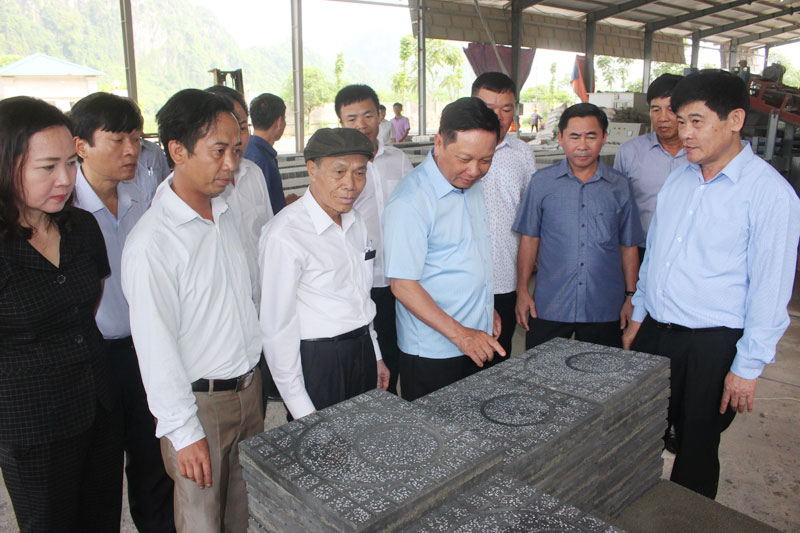
(HBO) – Secretary of the Hoa Binh provincial Party Committee Bui Van Tinh recently made a fact-finding tour of the stone carving village in Phu Thanh commune, Lac Thuy district, and a baking-free brick factory in Yen Thuy district. He was accompanied by Nguyen Van Dung, Vice Chairman of the provincial People’s Committee.

Secretary of the Hoa Binh provincial Party Committee
Bui Van Tinh visits and learns about the baking-free brick production of the
Nam Son Co. Ltd in Doan Ket commune, Yen Thuy district.
The stone carving village in Phu Thanh commune
was established in December 2016. Thirty local households have taken part in
stone carving activities. The craft creates stable jobs for more than 100
people who earn an average per capita income of 10 million VND (440 USD) each
month.
Meanwhile, the non-baked brick and floor tile
production line of the Nam Son Co. Ltd began operating in 2015 and has a designed
capacity of 1 million bricks per year, providing jobs for over 40 people with
monthly per capita income of 4.5 – 5 million VND (198 – 220 USD).
Secretary Bui Van Tinh highly valued activities
of the stone carving village in Phu Thanh commune, asking the administration of
Lac Thuy district and relevant departments and sectors to boost communication
activities to make the village and its products widely known.
Meanwhile, the banking-free brick and floor tile
production of the Nam Son Lo. Ltd, which also plans to make artificial sand, is
a new model that needs to be enhanced, he said, asking the firm to diversify
products, ensure occupational safety and health, prevent fire and explosion,
and protect the environment.
The provincial People’s Committee will issue
mechanisms to encourage the production and sale of artificial sand, he noted.
Regarding the production and consumption of
agricultural products, the official told Yen Thuy authorities to base on its
soil conditions to re-zone off farming areas in association with the preservation,
processing, sale and future export of local agricultural products. He also
requested stronger examination and management of contracts for production and
consumption cooperation to ensure legitimate interests of both businesses
The Standing Board of the Hoa Binh provincial Party Committee has agreed in principle on a proposal by the Standing Board of the Party Committee of Hoa Binh city to gather feedback on the city’s 1:2000 zoning plan, which forms part of its broader urban development strategy.
Hoa Binh province has made notable progress in public administration reform and digital government development, with the satisfaction index among citizens and businesses reaching over 84%, according to recent government evaluations.
Thanks to great efforts by local authorities in recent times, the governance and public administration performance of Mai Chau district has been significantly improved.
In the afternoon of June 6, the Party Committee, the People's Council, the People's Committee and the Fatherland Front of Lac Son district solemnly held a meeting to celebrate the 139th anniversary of the district's founding (1886–2025) and the 79th anniversary of the establishment of the district's Party Committee (1946–2025). There was the attendance of Mr. Bui Van Thang, the Vice Chairman of the Provincial People's Council; Mr. Quach Tat Liem, the Vice Chairman of the Provincial People's Committee; Ms. Dang Bich Ngoc, the Deputy Head of the National Assembly Delegation of the province; as well as the former leaders of the province and district through various periods, who are the natives of the district.
Implementing the Politburo’s Resolution No. 57-NQ/TW on breakthroughs in science – technology, innovation, and digital transformation is a golden opportunity for the northern mountainous province of Hoa Binh to renew growth model, improve competitive edge and shorten digital gap.
Resolution 57-NQ/TW, issued by the Politburo on December 22, 2024, identifies sci-tech, innovation, and digital transformation as strategic breakthroughs to build a developed and prosperous nation. In Hoa Binh province, this spirit is not just a slogan, it’s being put into action through concrete initiatives that form a "new development triangle”: digital citizenship, digital economy, and digital administration.



